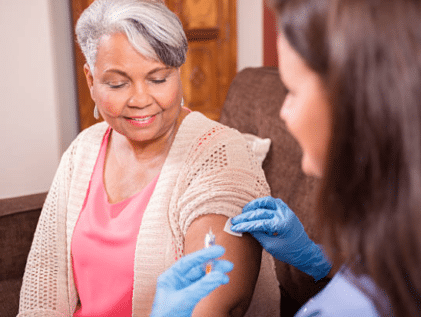More seniors than ever are living longer, healthier lives, thanks to factors like advances in healthcare; a greater focus on active lifestyles; and more opportunities for us all to make healthier choices. And while chronic illness remains a factor for a significant number of older adults, a decline in senior health is not considered a foregone conclusion by aging experts. The Centers for Disease Control point to significant preventive benefits for people 65+ who maintain a regular schedule of doctor visits and wellness screenings, both in delaying disease onset and progression and avoiding it all together. If you’re a senior or have one you care about, here’s a rundown of important screenings to stay on top of:
- Blood pressure: This is a critical one for seniors, for a number of reasons. Left unattended, blood pressure naturally tends to creep up on us as we get older, because of changes in arteries and overall circulation. And because high blood pressure usually has no accompanying symptoms, it’s up to your doctor to discover and treat. High blood pressure is the number one risk factor for heart disease, which itself is the number one cause of death for people 65 and up; need I say more?
- Diabetes: An estimated 12 million seniors – over 25% – have diabetes in this country, both diagnosed and undetected. This insidious autoimmune disease is linked to everything from heart disease to obesity to dementia, and does not always signal its arrival with distinct, identifiable symptoms. Screenings are conducted through blood work and are recommended every two years for those 65 and up – more frequently for seniors with family history, high blood pressure, obesity, or high cholesterol.
- Vaccinations: Regular vaccinations for seniors are critical – and not only in the winter months. A yearly flu shot is a must, for sure, but should go hand-in-hand with vaccines for pneumococcal pneumonia and shingles as well.
- Cancer: While there’s some variation in recommended age brackets and intervals, make sure mom and dad are getting proper medical guidance regarding screenings for treatable cancers – typically colon, skin, cervical, prostate, and breast.
- Prescription medications: 90% of Medicare recipients are prescribed some form of prescription medicine, with 40% taking five or more at the same time. Regular review and ongoing monitoring of these protocols is critical to make sure doses are correct and being properly administered.
- Mental health: We’ve talked in other posts about seniors’ susceptibility to isolation, loneliness, and associated depression. It’s critical that mom or dad have yearly wellness checks to prevent or proactively treat depression before it becomes a serious issue.
- Vision and hearing: Yearly screenings are recommended to detect and treat glaucoma, macular degeneration, cataracts, and other age-related deterioration. Hearing loss, while common in seniors, is often treatable, and should be screened for every year to two years.
- Height and weight: Because metabolism and mobility slow with age, annual weight checks are critical to help prevent obesity and other health issues associated with excess poundage. Height tracking for women can help detect changes in bone density associated with osteoporosis.
Want more information? Check out this great piece on the importance of preventive health for seniors.

